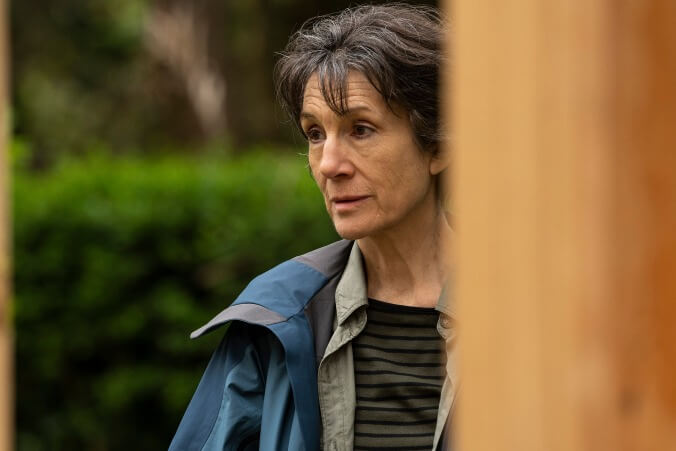The moving Irish family drama Herself puts hardship and hope on equal footing

Note: The writer of this review watched Herself on a digital screener from home. Before making the decision to see it—or any other film—in a movie theater, please consider the health risks involved. Here’s an interview on the matter with scientific experts.
Domestic violence extends, for many, far beyond the physical and into a brutal system not built with the survivor in mind. To leave an abusive household is an uphill battle in many advanced societies, where the courts and laws can put victims at a heavy disadvantage. Directed by Phyllida Lloyd (The Iron Lady), from a script by Malcom Campbell and star Clare Dunne, Herself approaches the subject gracefully, and with an unexpected degree of hope. In an era when neighbors often turn on neighbors, the film’s optimistic “It takes a village” perspective risks hokeyness. But thanks to Dunne’s quietly powerful performance as a single mother barely treading water, the end result is an effective, affecting look at community triumphing over fear.
Sandra (Dunne) and her two daughters, Molly (Molly McCann) and Emma (Ruby Rose O’Hara), are inherently happy people. At the film’s beginning, they giggle and dance to Sia in the kitchen of their Dublin home. The fun subsides, however, the moment that Sandra’s husband, Gary (Ian Lloyd Anderson), arrives home, clearly in a mood. He gently squats by the girls and tell them to go play outside while he “talks” with their mom. But just before they do, Sandra leans down to her oldest and whispers the code phrase “black widow,” before ushering Molly outside. Molly runs on foot to a local shop and opens her lunchbox, which contains a note taped to the lid instructing the clerk to call emergency services for help as her mother is being beaten viciously back home. Herself begins proper after that, observing Sandra trying, failing, and trying again to start a new life with her girls.
Refusing to shrink herself even in the presence of her ex-husband, Sandra has a headstrong streak that can get her into trouble: She turns her nose up at a dingy flat and instead dreams of building her own house based on a DIY video she found online. (A montage of plans, plotting, and preparations culminates in a devastating moment when a social services worker flatly dismisses Sandra’s home loan proposal, which includes hard numbers explaining the cost-saving measures of setting her up for self-sustaining independence instead of monthly rent.) Reckless assertiveness is, unfortunately, the character’s only real flaw—a dramatic oversight that primes Sandra for sainthood but doesn’t make her terribly interesting. Dunne’s valiant efforts compensate for that some, though: It’s a commanding, simmering performance.
With a pained grimace that quickly morphs into a smile, Sandra consistently puts on a brave face for her children. When either is hurting, as when Emma refuses to visit her father (per custody orders), Sandra doesn’t dismiss the young girl’s reluctance—she respects it and allows Emma to stay. This comes back to haunt her in a maddening courtroom scene, as Gary takes advantage of technicalities in the law. There, another performance shines: that of TV series regular Harriet Walter (Killing Eve, Succession), who plays Peggy, a doctor who employs Sandra for housecleaning and ends up launching a local micro-collective of volunteers to aid the family. A friend who won’t let another friend fail, she unblinkingly delivers the film’s most hard-hitting words of affirmation: “Most of us get so sunk in our own pain we don’t listen to our children’s. But you did, and that makes you a good mother and they’ve got to see that.”
On the other side of the custody battle, Anderson puts in unnerving work as a textbook abuser. For those who have survived such things, the predatory eyes, clenched jaw, and aggressive occupation of personal space may be triggering—a testament to a well-executed performance. Gary is a master manipulator, as many abusers are, and knows how to work people and structures in his favor. His voice is feather-soft as he pleads with Sandra to try to “work things out,” and when she holds fast and walks away, the mutation from sad dad to madman is swift. An explosive climax seems inevitable.
As Mister Rogers once instructed from his Neighborhood, “Look for the helpers.” There are plenty to be found, from the generous Peggy to a gentleman behind Sandra at the hardware store who won’t let the snooty clerk dismiss her request for a price check. That gentleman, Aido, is played to perfection by Conleth Hill, whose character on Game Of Thrones survived so long due to shady cleverness; Aido, by contrast, ensures the survival of others through golden-hearted kindness, all to the muted score of composer Natalie Holt. Lloyd enhances the power of her material with handheld shots that underscore the instability of Sandra’s new life or find a simple beauty amid the chaos. On a technical level, Herself is so unassuming that its craft might be overlooked.
In struggle-based narratives, the happy moments can often verge on twee. Not so with Lloyd’s movie. The grim nature of the confrontations with Gary and the monumental frustrations of the Dublin housing system provide a strong tether to keep the fluffy ode to community from floating beyond believability. Lloyd indulges in the ups and downs with equal cognizance. Sláinte, that toast to health, is the Irish phrase that’s made its way across most of the world. But Herself emphasizes another of the country’s maxims: that people are called to help each other, “and by doing that, they are helped in return.”